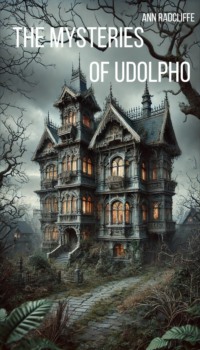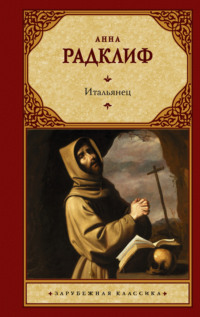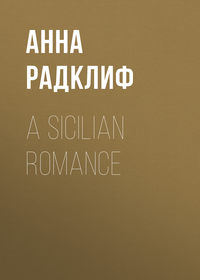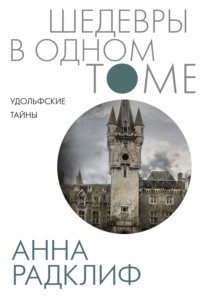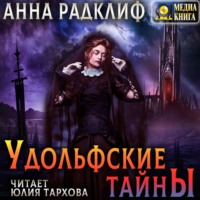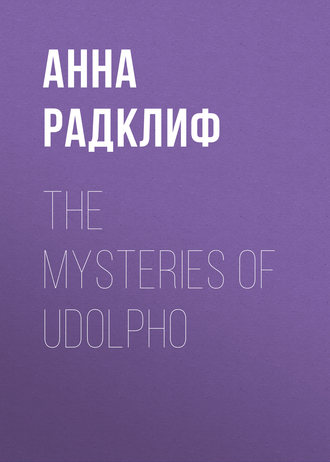
The Mysteries of Udolpho
At length, he informed her, that he had again visited the Chevalier, who had directed him to confide in the guard of the prison, from whom he had already received some instances of kindness, and who had promised to permit his going into the castle for half an hour, on the ensuing night, when Montoni and his companions should be engaged at their carousals. 'This was kind, to be sure,' added Ludovico: 'but Sebastian knows he runs no risque in letting the Chevalier out, for, if he can get beyond the bars and iron doors of the castle, he must be cunning indeed. But the Chevalier desired me, Signora, to go to you immediately, and to beg you would allow him to visit you, this night, if it was only for a moment, for that he could no longer live under the same roof, without seeing you; the hour, he said, he could not mention, for it must depend on circumstances (just as you said, Signora); and the place he desired you would appoint, as knowing which was best for your own safety.'
Emily was now so much agitated by the near prospect of meeting Valancourt, that it was some time, before she could give any answer to Ludovico, or consider of the place of meeting; when she did, she saw none, that promised so much security, as the corridor, near her own apartment, which she was checked from leaving, by the apprehension of meeting any of Montoni's guests, on their way to their rooms; and she dismissed the scruples, which delicacy opposed, now that a serious danger was to be avoided by encountering them. It was settled, therefore, that the Chevalier should meet her in the corridor, at that hour of the night, which Ludovico, who was to be upon the watch, should judge safest: and Emily, as may be imagined, passed this interval in a tumult of hope and joy, anxiety and impatience. Never, since her residence in the castle, had she watched, with so much pleasure, the sun set behind the mountains, and twilight shade, and darkness veil the scene, as on this evening. She counted the notes of the great clock, and listened to the steps of the sentinels, as they changed the watch, only to rejoice, that another hour was gone. 'O, Valancourt!' said she, 'after all I have suffered; after our long, long separation, when I thought I should never—never see you more—we are still to meet again! O! I have endured grief, and anxiety, and terror, and let me, then, not sink beneath this joy!' These were moments, when it was impossible for her to feel emotions of regret, or melancholy, for any ordinary interests;—even the reflection, that she had resigned the estates, which would have been a provision for herself and Valancourt for life, threw only a light and transient shade upon her spirits. The idea of Valancourt, and that she should see him so soon, alone occupied her heart.
At length the clock struck twelve; she opened the door to listen, if any noise was in the castle, and heard only distant shouts of riot and laughter, echoed feebly along the gallery. She guessed, that the Signor and his guests were at the banquet. 'They are now engaged for the night,' said she; 'and Valancourt will soon be here.' Having softly closed the door, she paced the room with impatient steps, and often went to the casement to listen for the lute; but all was silent, and, her agitation every moment increasing, she was at length unable to support herself, and sat down by the window. Annette, whom she detained, was, in the meantime, as loquacious as usual; but Emily heard scarcely any thing she said, and having at length risen to the casement, she distinguished the chords of the lute, struck with an expressive hand, and then the voice, she had formerly listened to, accompanied it.
Now rising love they fann'd, now pleasing doleThey breath'd in tender musings through the heart;And now a graver, sacred strain they stole,As when seraphic hands an hymn impart!Emily wept in doubtful joy and tenderness; and, when the strain ceased, she considered it as a signal, that Valancourt was about to leave the prison. Soon after, she heard steps in the corridor;—they were the light, quick steps of hope; she could scarcely support herself, as they approached, but opening the door of the apartment, she advanced to meet Valancourt, and, in the next moment, sunk in the arms of a stranger. His voice—his countenance instantly convinced her, and she fainted away.
On reviving, she found herself supported by the stranger, who was watching over her recovery, with a countenance of ineffable tenderness and anxiety. She had no spirits for reply, or enquiry; she asked no questions, but burst into tears, and disengaged herself from his arms; when the expression of his countenance changed to surprise and disappointment, and he turned to Ludovico, for an explanation; Annette soon gave the information, which Ludovico could not. 'O, sir!' said she, in a voice, interrupted with sobs; 'O, sir! you are not the other Chevalier. We expected Monsieur Valancourt, but you are not he! O Ludovico! how could you deceive us so? my poor lady will never recover it—never!' The stranger, who now appeared much agitated, attempted to speak, but his words faltered; and then striking his hand against his forehead, as if in sudden despair, he walked abruptly to the other end of the corridor.
Suddenly, Annette dried her tears, and spoke to Ludovico. 'But, perhaps,' said she, 'after all, the other Chevalier is not this: perhaps the Chevalier Valancourt is still below.' Emily raised her head. 'No,' replied Ludovico, 'Monsieur Valancourt never was below, if this gentleman is not he.' 'If you, sir,' said Ludovico, addressing the stranger, 'would but have had the goodness to trust me with your name, this mistake had been avoided.' 'Most true,' replied the stranger, speaking in broken Italian, 'but it was of the utmost consequence to me, that my name should be concealed from Montoni. Madam,' added he then, addressing Emily in French, 'will you permit me to apologize for the pain I have occasioned you, and to explain to you alone my name, and the circumstance, which has led me into this error? I am of France;—I am your countryman;—we are met in a foreign land.' Emily tried to compose her spirits; yet she hesitated to grant his request. At length, desiring, that Ludovico would wait on the stair-case, and detaining Annette, she told the stranger, that her woman understood very little Italian, and begged he would communicate what he wished to say, in that language.—Having withdrawn to a distant part of the corridor, he said, with a long-drawn sigh, 'You, madam, are no stranger to me, though I am so unhappy as to be unknown to you.—My name is Du Pont; I am of France, of Gascony, your native province, and have long admired,—and, why should I affect to disguise it?—have long loved you.' He paused, but, in the next moment, proceeded. 'My family, madam, is probably not unknown to you, for we lived within a few miles of La Vallee, and I have, sometimes, had the happiness of meeting you, on visits in the neighbourhood. I will not offend you by repeating how much you interested me; how much I loved to wander in the scenes you frequented; how often I visited your favourite fishing-house, and lamented the circumstance, which, at that time, forbade me to reveal my passion. I will not explain how I surrendered to temptation, and became possessed of a treasure, which was to me inestimable; a treasure, which I committed to your messenger, a few days ago, with expectations very different from my present ones. I will say nothing of these circumstances, for I know they will avail me little; let me only supplicate from you forgiveness, and the picture, which I so unwarily returned. Your generosity will pardon the theft, and restore the prize. My crime has been my punishment; for the portrait I stole has contributed to nourish a passion, which must still be my torment.'
Emily now interrupted him. 'I think, sir, I may leave it to your integrity to determine, whether, after what has just appeared, concerning Mons. Valancourt, I ought to return the picture. I think you will acknowledge, that this would not be generosity; and you will allow me to add, that it would be doing myself an injustice. I must consider myself honoured by your good opinion, but'—and she hesitated,—'the mistake of this evening makes it unnecessary for me to say more.'
'It does, madam,—alas! it does!' said the stranger, who, after a long pause, proceeded.—'But you will allow me to shew my disinterestedness, though not my love, and will accept the services I offer. Yet, alas! what services can I offer? I am myself a prisoner, a sufferer, like you. But, dear as liberty is to me, I would not seek it through half the hazards I would encounter to deliver you from this recess of vice. Accept the offered services of a friend; do not refuse me the reward of having, at least, attempted to deserve your thanks.'
'You deserve them already, sir,' said Emily; 'the wish deserves my warmest thanks. But you will excuse me for reminding you of the danger you incur by prolonging this interview. It will be a great consolation to me to remember, whether your friendly attempts to release me succeed or not, that I have a countryman, who would so generously protect me.'—Monsieur Du Pont took her hand, which she but feebly attempted to withdraw, and pressed it respectfully to his lips. 'Allow me to breathe another fervent sigh for your happiness,' said he, 'and to applaud myself for an affection, which I cannot conquer.' As he said this, Emily heard a noise from her apartment, and, turning round, saw the door from the stair-case open, and a man rush into her chamber. 'I will teach you to conquer it,' cried he, as he advanced into the corridor, and drew a stiletto, which he aimed at Du Pont, who was unarmed, but who, stepping back, avoided the blow, and then sprung upon Verezzi, from whom he wrenched the stiletto. While they struggled in each other's grasp, Emily, followed by Annette, ran further into the corridor, calling on Ludovico, who was, however, gone from the stair-case, and, as she advanced, terrified and uncertain what to do, a distant noise, that seemed to arise from the hall, reminded her of the danger she was incurring; and, sending Annette forward in search of Ludovico, she returned to the spot where Du Pont and Verezzi were still struggling for victory. It was her own cause which was to be decided with that of the former, whose conduct, independently of this circumstance, would, however, have interested her in his success, even had she not disliked and dreaded Verezzi. She threw herself in a chair, and supplicated them to desist from further violence, till, at length, Du Pont forced Verezzi to the floor, where he lay stunned by the violence of his fall; and she then entreated Du Pont to escape from the room, before Montoni, or his party, should appear; but he still refused to leave her unprotected; and, while Emily, now more terrified for him, than for herself, enforced the entreaty, they heard steps ascending the private stair-case.
'O you are lost!' cried she, 'these are Montoni's people.' Du Pont made no reply, but supported Emily, while, with a steady, though eager, countenance, he awaited their appearance, and, in the next moment, Ludovico, alone, mounted the landing-place. Throwing an hasty glance round the chamber, 'Follow me,' said he, 'as you value your lives; we have not an instant to lose!'
Emily enquired what had occurred, and whither they were to go?
'I cannot stay to tell you now, Signora,' replied Ludovico: 'fly! fly!'
She immediately followed him, accompanied by Mons. Du Pont, down the stair-case, and along a vaulted passage, when suddenly she recollected Annette, and enquired for her. 'She awaits us further on, Signora,' said Ludovico, almost breathless with haste; 'the gates were open, a moment since, to a party just come in from the mountains: they will be shut, I fear, before we can reach them! Through this door, Signora,' added Ludovico, holding down the lamp, 'take care, here are two steps.'
Emily followed, trembling still more, than before she had understood, that her escape from the castle, depended upon the present moment; while Du Pont supported her, and endeavoured, as they passed along, to cheer her spirits.
'Speak low, Signor,' said Ludovico, 'these passages send echoes all round the castle.'
'Take care of the light,' cried Emily, 'you go so fast, that the air will extinguish it.'
Ludovico now opened another door, where they found Annette, and the party then descended a short flight of steps into a passage, which, Ludovico said, led round the inner court of the castle, and opened into the outer one. As they advanced, confused and tumultuous sounds, that seemed to come from the inner court, alarmed Emily. 'Nay, Signora,' said Ludovico, 'our only hope is in that tumult; while the Signor's people are busied about the men, who are just arrived, we may, perhaps, pass unnoticed through the gates. But hush!' he added, as they approached the small door, that opened into the outer court, 'if you will remain here a moment, I will go to see whether the gates are open, and any body is in the way. Pray extinguish the light, Signor, if you hear me talking,' continued Ludovico, delivering the lamp to Du Pont, 'and remain quite still.'
Saying this, he stepped out upon the court, and they closed the door, listening anxiously to his departing steps. No voice, however, was heard in the court, which he was crossing, though a confusion of many voices yet issued from the inner one. 'We shall soon be beyond the walls,' said Du Pont softly to Emily, 'support yourself a little longer, Madam, and all will be well.'
But soon they heard Ludovico speaking loud, and the voice also of some other person, and Du Pont immediately extinguished the lamp. 'Ah! it is too late!' exclaimed Emily, 'what is to become of us?' They listened again, and then perceived, that Ludovico was talking with a sentinel, whose voices were heard also by Emily's favourite dog, that had followed her from the chamber, and now barked loudly. 'This dog will betray us!' said Du Pont, 'I will hold him.' 'I fear he has already betrayed us!' replied Emily. Du Pont, however, caught him up, and, again listening to what was going on without, they heard Ludovico say, 'I'll watch the gates the while.'
'Stay a minute,' replied the sentinel, 'and you need not have the trouble, for the horses will be sent round to the outer stables, then the gates will be shut, and I can leave my post.' 'I don't mind the trouble, comrade,' said Ludovico, 'you will do such another good turn for me, some time. Go—go, and fetch the wine; the rogues, that are just come in, will drink it all else.'
The soldier hesitated, and then called aloud to the people in the second court, to know why they did not send out the horses, that the gates might be shut; but they were too much engaged, to attend to him, even if they had heard his voice.
'Aye—aye,' said Ludovico, 'they know better than that; they are sharing it all among them; if you wait till the horses come out, you must wait till the wine is drunk. I have had my share already, but, since you do not care about yours, I see no reason why I should not have that too.'
'Hold, hold, not so fast,' cried the sentinel, 'do watch then, for a moment: I'll be with you presently.'
'Don't hurry yourself,' said Ludovico, coolly, 'I have kept guard before now. But you may leave me your trombone,* that, if the castle should be attacked, you know, I may be able to defend the pass, like a hero.'
(* A kind of blunderbuss. [A. R.])
'There, my good fellow,' returned the soldier, 'there, take it—it has seen service, though it could do little in defending the castle. I'll tell you a good story, though, about this same trombone.'
'You'll tell it better when you have had the wine,' said Ludovico. 'There! they are coming out from the court already.'
'I'll have the wine, though,' said the sentinel, running off. 'I won't keep you a minute.'
'Take your time, I am in no haste,' replied Ludovico, who was already hurrying across the court, when the soldier came back. 'Whither so fast, friend—whither so fast?' said the latter. 'What! is this the way you keep watch! I must stand to my post myself, I see.'
'Aye, well,' replied Ludovico, 'you have saved me the trouble of following you further, for I wanted to tell you, if you have a mind to drink the Tuscany wine, you must go to Sebastian, he is dealing it out; the other that Federico has, is not worth having. But you are not likely to have any, I see, for they are all coming out.'
'By St. Peter! so they are,' said the soldier, and again ran off, while Ludovico, once more at liberty, hastened to the door of the passage, where Emily was sinking under the anxiety this long discourse had occasioned; but, on his telling them the court was clear, they followed him to the gates, without waiting another instant, yet not before he had seized two horses, that had strayed from the second court, and were picking a scanty meal among the grass, which grew between the pavement of the first.
They passed, without interruption, the dreadful gates, and took the road that led down among the woods, Emily, Monsieur Du Pont and Annette on foot, and Ludovico, who was mounted on one horse, leading the other. Having reached them, they stopped, while Emily and Annette were placed on horseback with their two protectors, when, Ludovico leading the way, they set off as fast as the broken road, and the feeble light, which a rising moon threw among the foliage, would permit.
Emily was so much astonished by this sudden departure, that she scarcely dared to believe herself awake; and she yet much doubted whether this adventure would terminate in escape,—a doubt, which had too much probability to justify it; for, before they quitted the woods, they heard shouts in the wind, and, on emerging from them, saw lights moving quickly near the castle above. Du Pont whipped his horse, and with some difficulty compelled him to go faster.
'Ah! poor beast,' said Ludovico, 'he is weary enough;—he has been out all day; but, Signor, we must fly for it, now; for yonder are lights coming this way.'
Having given his own horse a lash, they now both set off on a full gallop; and, when they again looked back, the lights were so distant as scarcely to be discerned, and the voices were sunk into silence. The travellers then abated their pace, and, consulting whither they should direct their course, it was determined they should descend into Tuscany, and endeavour to reach the Mediterranean, where they could readily embark for France. Thither Du Pont meant to attend Emily, if he should learn, that the regiment he had accompanied into Italy, was returned to his native country.
They were now in the road, which Emily had travelled with Ugo and Bertrand; but Ludovico, who was the only one of the party, acquainted with the passes of these mountains, said, that, a little further on, a bye-road, branching from this, would lead them down into Tuscany with very little difficulty; and that, at a few leagues distance, was a small town, where necessaries could be procured for their journey.
'But, I hope,' added he, 'we shall meet with no straggling parties of banditti; some of them are abroad, I know. However, I have got a good trombone, which will be of some service, if we should encounter any of those brave spirits. You have no arms, Signor?' 'Yes,' replied Du Pont, 'I have the villain's stilletto, who would have stabbed me—but let us rejoice in our escape from Udolpho, nor torment ourselves with looking out for dangers, that may never arrive.'
The moon was now risen high over the woods, that hung upon the sides of the narrow glen, through which they wandered, and afforded them light sufficient to distinguish their way, and to avoid the loose and broken stones, that frequently crossed it. They now travelled leisurely, and in profound silence; for they had scarcely yet recovered from the astonishment, into which this sudden escape had thrown them.—Emily's mind, especially, was sunk, after the various emotions it had suffered, into a kind of musing stillness, which the reposing beauty of the surrounding scene and the creeping murmur of the night-breeze among the foliage above contributed to prolong. She thought of Valancourt and of France, with hope, and she would have thought of them with joy, had not the first events of this evening harassed her spirits too much, to permit her now to feel so lively a sensation. Meanwhile, Emily was alone the object of Du Pont's melancholy consideration; yet, with the despondency he suffered, as he mused on his recent disappointment, was mingled a sweet pleasure, occasioned by her presence, though they did not now exchange a single word. Annette thought of this wonderful escape, of the bustle in which Montoni and his people must be, now that their flight was discovered; of her native country, whither she hoped she was returning, and of her marriage with Ludovico, to which there no longer appeared any impediment, for poverty she did not consider such. Ludovico, on his part, congratulated himself, on having rescued his Annette and Signora Emily from the danger, that had surrounded them; on his own liberation from people, whose manners he had long detested; on the freedom he had given to Monsieur Du Pont; on his prospect of happiness with the object of his affections, and not a little on the address, with which he had deceived the sentinel, and conducted the whole of this affair.
Thus variously engaged in thought, the travellers passed on silently, for above an hour, a question only being, now and then, asked by Du Pont, concerning the road, or a remark uttered by Annette, respecting objects, seen imperfectly in the twilight. At length, lights were perceived twinkling on the side of a mountain, and Ludovico had no doubt, that they proceeded from the town he had mentioned, while his companions, satisfied by this assurance, sunk again into silence. Annette was the first who interrupted this. 'Holy Peter!' said she, 'What shall we do for money on our journey? for I know neither I, or my lady, have a single sequin; the Signor took care of that!'
This remark produced a serious enquiry, which ended in as serious an embarrassment, for Du Pont had been rifled of nearly all his money, when he was taken prisoner; the remainder he had given to the sentinel, who had enabled him occasionally to leave his prison-chamber; and Ludovico, who had for some time found a difficulty, in procuring any part of the wages due to him, had now scarcely cash sufficient to procure necessary refreshment at the first town, in which they should arrive.
Their poverty was the more distressing, since it would detain them among the mountains, where, even in a town, they could scarcely consider themselves safe from Montoni. The travellers, however, had only to proceed and dare the future; and they continued their way through lonely wilds and dusky vallies, where the overhanging foliage now admitted, and then excluded the moon-light;—wilds so desolate, that they appeared, on the first glance, as if no human being had ever trode them before. Even the road, in which the party were, did but slightly contradict this error, for the high grass and other luxuriant vegetation, with which it was overgrown, told how very seldom the foot of a traveller had passed it.
At length, from a distance, was heard the faint tinkling of a sheep-bell; and, soon after, the bleat of flocks, and the party then knew, that they were near some human habitation, for the light, which Ludovico had fancied to proceed from a town, had long been concealed by intervening mountains. Cheered by this hope, they quickened their pace along the narrow pass they were winding, and it opened upon one of those pastoral vallies of the Apennines, which might be painted for a scene of Arcadia, and whose beauty and simplicity are finely contrasted by the grandeur of the snow-topt mountains above.
The morning light, now glimmering in the horizon, shewed faintly, at a little distance, upon the brow of a hill, which seemed to peep from 'under the opening eye-lids of the morn,' the town they were in search of, and which they soon after reached. It was not without some difficulty, that they there found a house, which could afford shelter for themselves and their horses; and Emily desired they might not rest longer than was necessary for refreshment. Her appearance excited some surprise, for she was without a hat, having had time only to throw on her veil before she left the castle, a circumstance, that compelled her to regret again the want of money, without which it was impossible to procure this necessary article of dress.


